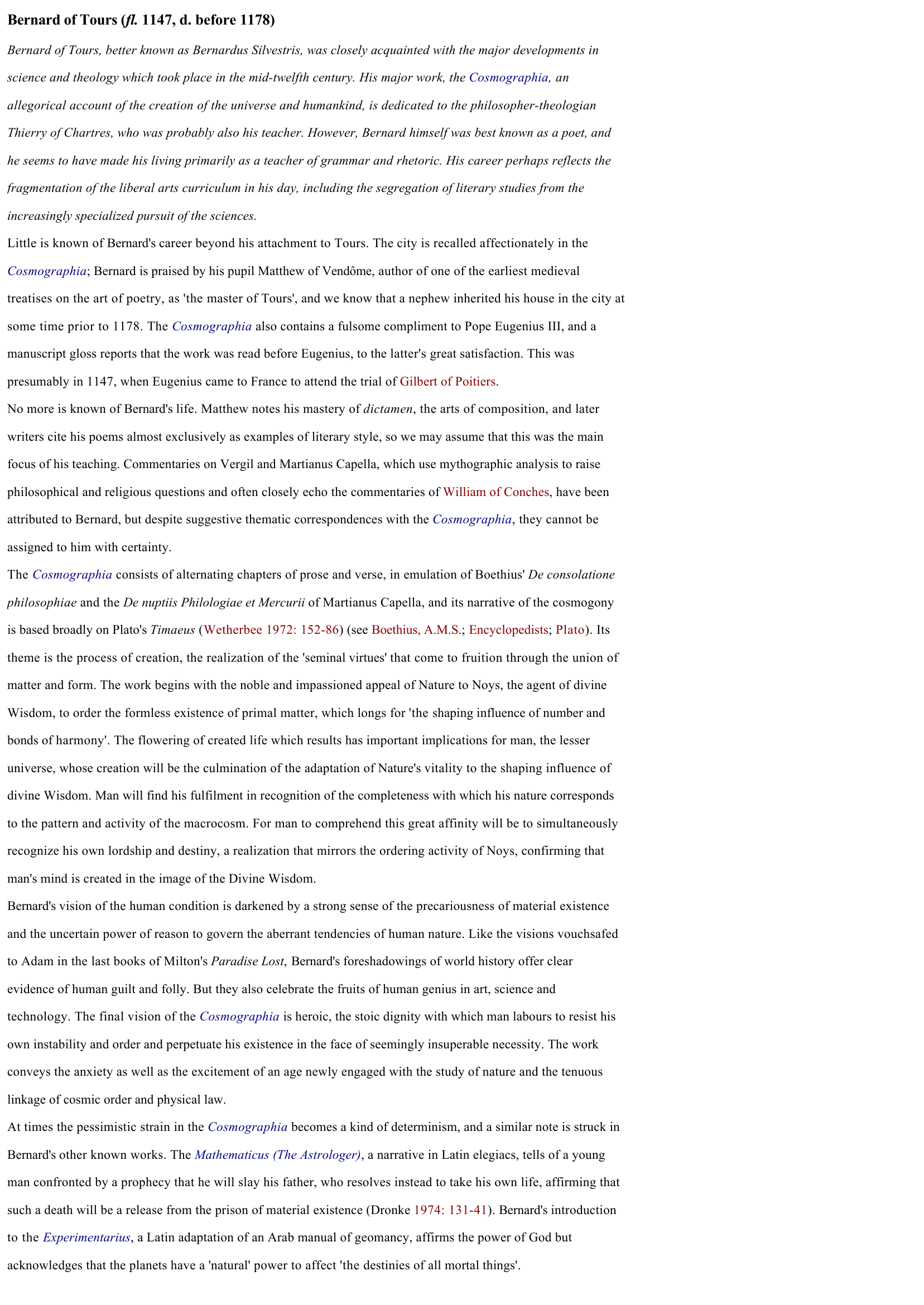Bernard of Tours
Extrait du document
«
Bernard of Tours (fl.
1147, d.
before 1178)
Bernard of Tours, better known as Bernardus Silvestris, was closely acquainted with the major developments in
science and theology which took place in the mid-twelfth century.
His major work, the Cosmographia, an
allegorical account of the creation of the universe and humankind, is dedicated to the philosopher-theologian
Thierry of Chartres, who was probably also his teacher.
However, Bernard himself was best known as a poet, and
he seems to have made his living primarily as a teacher of grammar and rhetoric.
His career perhaps reflects the
fragmentation of the liberal arts curriculum in his day, including the segregation of literary studies from the
increasingly specialized pursuit of the sciences.
Little is known of Bernard's career beyond his attachment to Tours.
The city is recalled affectionately in the
Cosmographia; Bernard is praised by his pupil Matthew of Vendôme, author of one of the earliest medieval
treatises on the art of poetry, as 'the master of Tours', and we know that a nephew inherited his house in the city at
some time prior to 1178.
The Cosmographia also contains a fulsome compliment to Pope Eugenius III, and a
manuscript gloss reports that the work was read before Eugenius, to the latter's great satisfaction.
This was
presumably in 1147, when Eugenius came to France to attend the trial of Gilbert of Poitiers.
No more is known of Bernard's life.
Matthew notes his mastery of dictamen, the arts of composition, and later
writers cite his poems almost exclusively as examples of literary style, so we may assume that this was the main
focus of his teaching.
Commentaries on Vergil and Martianus Capella, which use mythographic analysis to raise
philosophical and religious questions and often closely echo the commentaries of William of Conches, have been
attributed to Bernard, but despite suggestive thematic correspondences with the Cosmographia, they cannot be
assigned to him with certainty.
The Cosmographia consists of alternating chapters of prose and verse, in emulation of Boethius' De consolatione
philosophiae and the De nuptiis Philologiae et Mercurii of Martianus Capella, and its narrative of the cosmogony
is based broadly on Plato's Timaeus (Wetherbee 1972: 152-86) (see Boethius, A.M.S.; Encyclopedists; Plato).
Its
theme is the process of creation, the realization of the 'seminal virtues' that come to fruition through the union of
matter and form.
The work begins with the noble and impassioned appeal of Nature to Noys, the agent of divine
Wisdom, to order the formless existence of primal matter, which longs for 'the shaping influence of number and
bonds of harmony'.
The flowering of created life which results has important implications for man, the lesser
universe, whose creation will be the culmination of the adaptation of Nature's vitality to the shaping influence of
divine Wisdom.
Man will find his fulfilment in recognition of the completeness with which his nature corresponds
to the pattern and activity of the macrocosm.
For man to comprehend this great affinity will be to simultaneously
recognize his own lordship and destiny, a realization that mirrors the ordering activity of Noys, confirming that
man's mind is created in the image of the Divine Wisdom.
Bernard's vision of the human condition is darkened by a strong sense of the precariousness of material existence
and the uncertain power of reason to govern the aberrant tendencies of human nature.
Like the visions vouchsafed
to Adam in the last books of Milton's Paradise Lost, Bernard's foreshadowings of world history offer clear
evidence of human guilt and folly.
But they also celebrate the fruits of human genius in art, science and
technology.
The final vision of the Cosmographia is heroic, the stoic dignity with which man labours to resist his
own instability and order and perpetuate his existence in the face of seemingly insuperable necessity.
The work
conveys the anxiety as well as the excitement of an age newly engaged with the study of nature and the tenuous
linkage of cosmic order and physical law.
At times the pessimistic strain in the Cosmographia becomes a kind of determinism, and a similar note is struck in
Bernard's other known works.
The Mathematicus (The Astrologer), a narrative in Latin elegiacs, tells of a young
man confronted by a prophecy that he will slay his father, who resolves instead to take his own life, affirming that
such a death will be a release from the prison of material existence (Dronke 1974: 131-41).
Bernard's introduction
to the Experimentarius, a Latin adaptation of an Arab manual of geomancy, affirms the power of God but
acknowledges that the planets have a 'natural' power to affect 'the destinies of all mortal things'..
»
↓↓↓ APERÇU DU DOCUMENT ↓↓↓
Liens utiles
- Bernard: La science a-t-elle le monopole de la vérité ?
- BERNARD: «Un phénomène vital a, comme tout autre phénomène, un déterminisme rigoureux [qui] ne saurait être autre chose qu'un déterminisme physico-chimique. La force vitale, la vie, appartiennent au monde métaphysique... »
- Cl. Bernard écrit : « Dans sa marche à travers les siècles, la médecine constamment forcée d'agir, a tenté d'innombrables essais dans le domaine de l'empirisme et en a tiré d'utiles enseignements. Si elle a été sillonnée et bouleversée par des systèmes d
- Commentez et discutez ce texte de Claude Bernard : « Nos idées ne sont que des instruments intellectuels qui nous servent à pénétrer les phénomènes. Il faut les changer quand elles ont rempli leur rôle comme on change de bistouri quand il a servi trop lo
- Quel est le sens, ou la portée, et quelles sont les limites des affirmations suivantes de Cl. Bernard : « Nous pouvons suivre notre sentiment et notre idée, donner carrière à notre imagination, pourvu que toutes nos idées ne soient que des prétextes à in

































